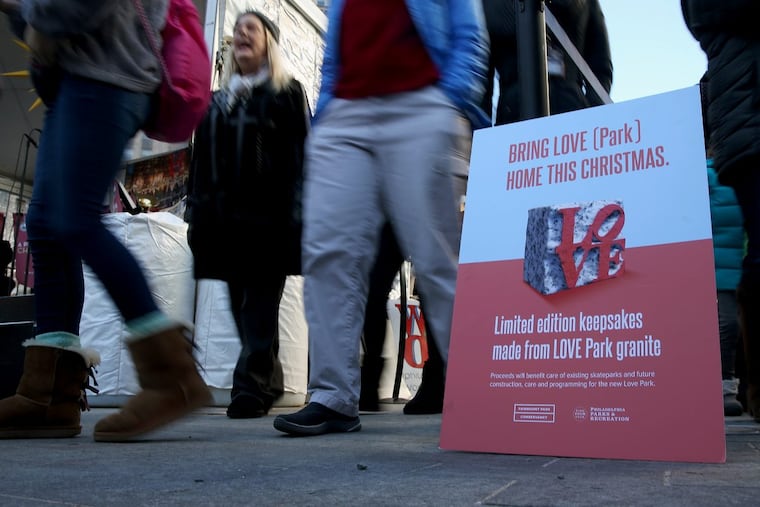City still seeking permission for LOVE sculpture design
In emails sent out this week, the city said it's still trying to get permission to use the image from Robert Indiana, who created the iconic sculpture.

The 300 people who showed up to buy a piece of granite from LOVE Park, painted with a rendering of the LOVE sculpture, won't get the mementos in time for the holidays.
In emails sent out this week, the city said it is still trying to get permission to use the image from Robert Indiana, who created the iconic artwork.
"We're still engaged in ongoing discussions," parks and recreation spokeswoman Jennifer Crandall said. "If something is going to happen in 2018, we'll be in touch, but we felt it was only fair to let them know nothing was going to happen before the end of the year, so they weren't holding their breath."
Proceeds from each $50 block would fund programs and upkeep in city parks.
Hundreds of hopeful block-buyers showed up at the Christmas Village in LOVE Park on Nov. 24 to buy the pieces of granite excavated from the plaza during renovations. The sale was abruptly halted after the city got a cease-and-desist letter from the agency representing Indiana.
City attorney Brad Ham would not comment on why the city thought it had permission to use the likeness of the image.
It's not the first time the city has sold objects with LOVE on them. The gift shop in LOVE Park, currently under construction, sold LOVE mementos for years. The City Hall gift shop sells a small LOVE pencil sharpener.
Ham said the incident will prompt the Law Department to review whether the city had secured permission to sell other mementos.
Citywide, nearly every object imaginable has been emblazoned with the image – from knee socks to waffle irons, to LOVE wedding cakes and ice sculptures. Amazon lists 5,994 items with "Philadelphia love sign." It's unclear what triggered Indiana's representatives to stop this sale.
The Artists Rights Society, which represents Indiana's licensing interests, did not return multiple calls requesting comment.
"Sometimes it's just not worth it to step in when someone is making an unlicensed use of their work, because it's too hard to police," said Christine Weller, a copyright attorney at Griesing Law who represents artists in intellectual property rights cases. "But artists are people too, and they have to make a living, so if they make their own branded gear, T-shirts with a copyright-protected image, they want to keep other people from making those same T-shirts."
Indiana first painted the LOVE design on a Christmas card commissioned by the Museum of Modern Art in 1965. He didn't copyright the work, as required to prevent copycats under a 1909 law, and versions of it became ubiquitous.
In 1976, the year Indiana unveiled his sculpture in Philadelphia, the Copyright Act of 1976 went into effect, granting artists sole ownership of their work regardless of whether they registered it..
But the law, which protects a work for as long as the artist is alive plus 70 years, hasn't stopped a steady stream of reproductions since it was created.
Indiana recently trademarked his LOVE design.
The Morgan Art Foundation, on behalf of Indiana, holds two federal trademarks for 'the letters "LO" above letters "VE" in a stylized form.' The trademarks, both filed in 2014, apply to dozens of items and services, including calendars, postcards, works of art, computer software, jewelry, clothing, sunglasses, marketing and promotional services, decorations for Christmas trees, umbrellas, and greeting cards. A second pending trademark, filed in August, would cover animal crates, pet beds, and objects made of china.
Weller, the copyright attorney, said business owners may want to find out if they're in the clear. In the case of copyright violations, it's often better to ask permission than forgiveness, she said.
"You could face a lawsuit or a cease and desist letter," Weller said. "And then you're stuck with a lot of stuff you might not be able to sell."